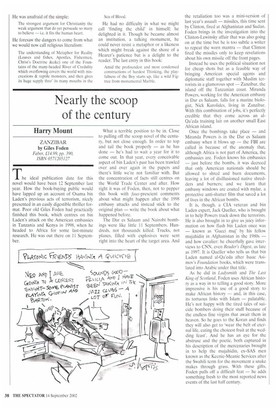Nearly the scoop of the century
Harry Mount
ZANZIBAR by Giles Foden
Faber, .04.99, pp. 390, ISBN 0571205127
The ideal publication date for this novel would have been 12 September last year. How the book-buying public would have lapped up an account of Osama bin Laden's previous acts of terrorism, nicely presented in an easily digestible thriller format. Poor old Giles Foden had practically finished this book, which centres on bin Laden's attack on the American embassies in Tanzania and Kenya in 1998, when he headed to Africa for some last-minute research. He was out there on 11 September.
What a terrible position to be in. Close to pulling off the scoop novel of the century, but not close enough. In order to top and tail the book properly — as he has done — he's had to wait a year for it to come out. In that year, every conceivable aspect of bin Laden's past has been trawled over and over again in the papers and there's little we're not familiar with. But the concentration of facts still centres on the World Trade Center and after. How right it was of Foden, then, not to pepper this book with faux-prescient comments about what might happen after the 1998 embassy attacks and instead stick to the original plan — write the book about what happened before.
The Dar es Salaam and Nairobi bombings were like little 11 Septembers. Hundreds, not thousands killed. Trucks, not planes, filled with explosives were sent right into the heart of the target area. And
the retaliation too was a mini-version of last year's assault — missiles, this time sent by Clinton, fired at Afghanistan and Sudan. Foden brings in the investigation into the Clinton-Lewinsky affair that was also going on at the time but he is too subtle a writer to repeat the WOIT1 mantra — that Clinton fired the missiles only to keep revelations about his own missile off the front pages.
Instead he uses the political situation not for cheap shots but as a feasible way of bringing American special agents and diplomatic staff together with Muslim terrorists in a glamorous spot — Zanzibar, the island off the Tanzanian coast. Miranda Powers, working for the American embassy in Dar es Salaam, falls for a marine biologist, Nick Karolides, living in Zanzibar. With this combination of jobs, it's perfectly credible that they come across an alQa'eda training lair on another small East African island.
Once the bombings take place — and Miranda Powers is in the Dar es Salaam embassy when it blows up — the FBI are called in because of the anomaly that, although Africa is not part of America, the embassies are. Foden knows his embassies — just before the bombs, it was decreed that only American nationals should be allowed to shred and burn documents, leaving a lot of disillusioned native shredders and burners; and we learn that embassy windows are coated with mylar, protective anti-shatter film that saved a lot of lives in the African bombs.
It is, though, a CIA veteran and bin Laden expert, Jack Queller, who is brought in to help Powers track down the terrorists. He is also brought in to give us juicy information on how flash bin Laden once was — known as 'Gucci muj' by his fellow mujahidin in Afghanistan in the 1980s — and how cavalier: he cheerfully gave interviews to CNN, even Reader's Digest, as late as 1997. It is Queller who tells us that bin Laden named al-Qa'eda after Isaac Asimov's Foundation books, which were translated into Arabic under that title.
As he did in Ladysmith and The Last King of Scotland, Foden uses African history as a way in to telling a good story. More impressive is his use of a good story to make African history — and, in this case, its tortuous links with Islam — palatable. He's not happy with the tired tales of suicide bombers doing their stuff because of the endless fine virgins that await them in heaven. So he goes to the Koran and finds they will also get to 'wear the belt of eternal life, eating the choicest fruit at the wedding feast'. And he has an eye for the abstruse and the poetic, both captured in his description of the mercenaries brought in to help the mujahidin, ex–SAS men known as the Keenie-Meanie Services after the Swahili term for the movement a snake makes through grass. With these gifts, Foden pulls off a difficult feat — he adds something fresh to the most reported news events of the last half century.










































































 Previous page
Previous page